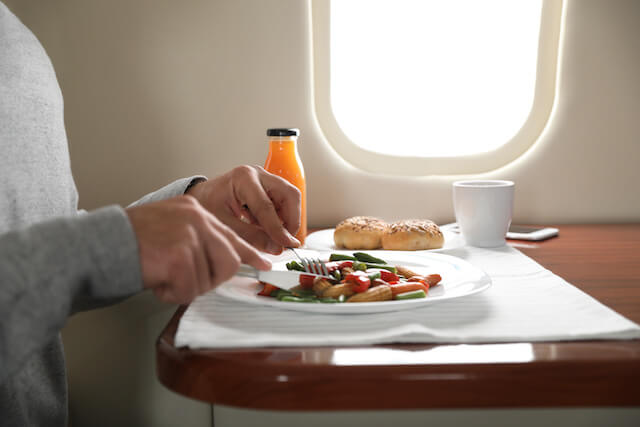Airlines tackle sustainability in new report

The WTCE report tackles sustainability challenges in airline food and beverage
A new report Tackling sustainability in the airline industry: insights from the experts on future challenges and how they can be overcome has been produced the World Travel Catering and Onboard Services Expo (WTCE) in association with Foodcase International.
The study, which breaks down the aviation industry’s biggest food and beverage sustainability challenges, saw cost and profitability as recurring themes for carriers and suppliers when asked about the issues they face and how they are tackling them. Eliminating food and packaging waste and ‘light weighting’ aircraft are also highlighted as key to reducing fuel use and in turn C02 emissions - two of the biggest issues facing the industry.
The report features interviews with representatives from leading airlines including AirAsia, Cathay Pacific, Scandinavian Airlines (SAS) and Icelandair, the report underscores several top eco-concerns among carriers, with sustainable packaging, recyclability, and single-use plastic among the immediate challenges. The ability to balance the correct quantity of fresh and dry goods to minimise food waste are also cited.
While eliminating food and packaging waste overall are major issues among operators, when pressed on what is more important, the operators are divided. For some, such as Icelandair, food waste is clearly more important as it has a greater impact on sustainability and cost at the same time. Reducing food waste is key to maximising revenues and bringing down costs for both Icelandair and AirAsia.
For Cathay Pacific, reducing unsustainable food packaging waste is a firm focus. The same is true for SAS, which commented that it already had good systems – such as load optimisation – in place to reduce food waste and is reliant on suppliers to collaborate when it comes to packaging.
When asked specifically what suppliers can do to help airlines meet sustainability targets, the operators agree that focusing on product packaging is key to tackling the issue. Suggestions include packaging products in a single material so they are easier to sort like paper or plastic, reducing single-use plastic, using more sustainable packaging materials as well as sharing more information on the types of packaging used so that airlines can collaborate with suppliers to improve the whole chain. Reducing food portion sizes and packs to eliminate food waste is also deemed crucial.
Looking to the future regarding what is to come in terms of sustainable food and beverage offers onboard, the airlines have a long list of measures they would like to implement, from more pre-ordering and personalisation to catering to different dietary needs.
“Airlines will offer a larger selection of fresh food options via pre-order to maintain (even increase) the service standards and offer a simpler selection onboard”, said Icelandair’s Iris Anna Groenewegen.
Kalen Tang from Cathay Pacific Catering Services commented that they would “want to develop more plant-based cuisine.”
The report also asks similar questions of suppliers. Unsurprisingly, all are vocal in their support for more stringent environment-friendly packaging measures. Plastic pollution is one of the key concerns, particularly plastic cups, and trays, along with products wrapped in multiple layers of plastic.
Dinesh Tadepalli from Incredibleeats.com, which supplies edible cutlery, commented: “Why can’t airlines use paper cups, or ask passengers to bring their own refillable water bottles?” In terms of food waste, he added: “On a lot of long-haul flights I see pre-made boxes of food containing multiple items such as nuts, cheese raisins or crackers. If waste is such an issue, why give so many options to one person if they aren’t going to consume them all.”
When questioned on the one thing airlines can do now to improve sustainability, Alison Wells from Plane Talking Products – a member of the Aviation Sustainability Forum – cites the need for unification in the industry. “We need to share information and try not to see the green initiatives as being a competitive advantage…We are all facing the same predicament for the planet and really no one has met the challenge or solved the ‘issue’ until we all have, so we can’t leave anyone behind – we must pull together.”
Tadepalli believes the airlines need to act now, rather than in 20 years’ time. He commented: “The next generation will be the driving force behind change. They are more serious because they understand that their future is at stake…for the airlines, more sustainability measures might not be ‘super profitable’ in the short-term, but in the long run, taking action now would help them.”
Polly Magraw, Event Director at WTCE concluded: “This study brings into sharp focus the immediate sustainability issues at stake in the aviation industry. Not only does it confirm the importance of eliminating food and packaging waste for both carriers and their suppliers, but it highlights some of the potential ways in which solutions might be found if everyone commits to working together. Sustainability is a key theme of this year’s event. I’d urge all the major partners – and competitors in the industry to use it as a forum to come together to share ideas and take the first steps towards a collaborative approach.”
For more information, or to download the report, visit the WTCE website.

